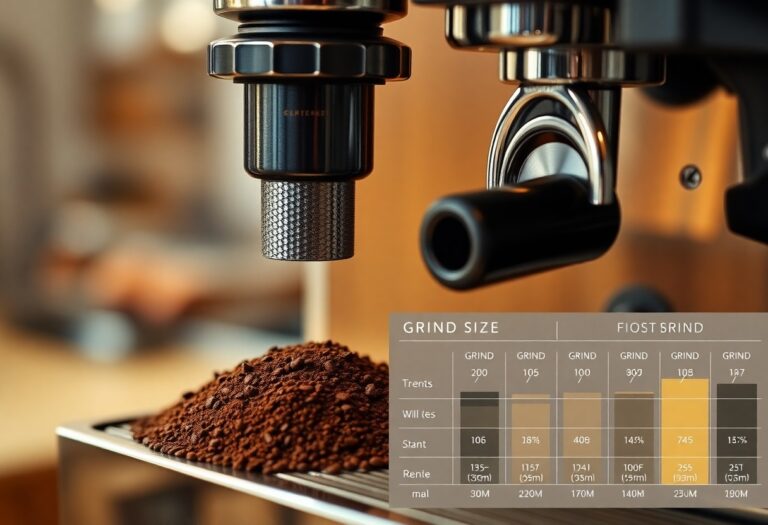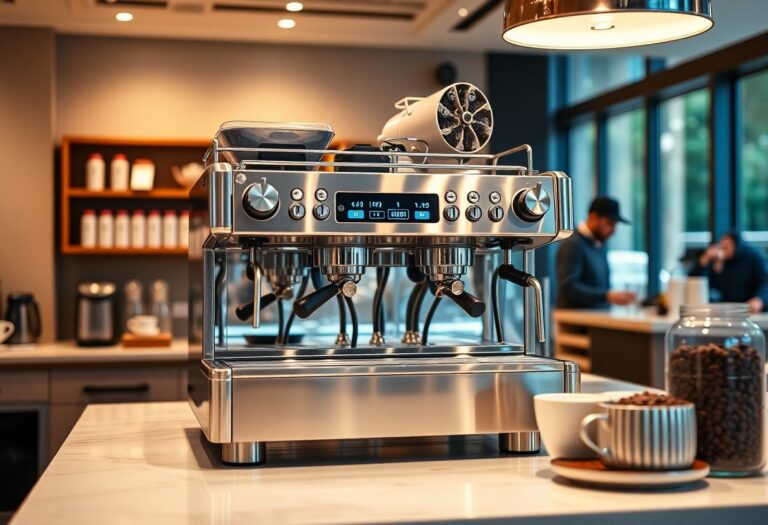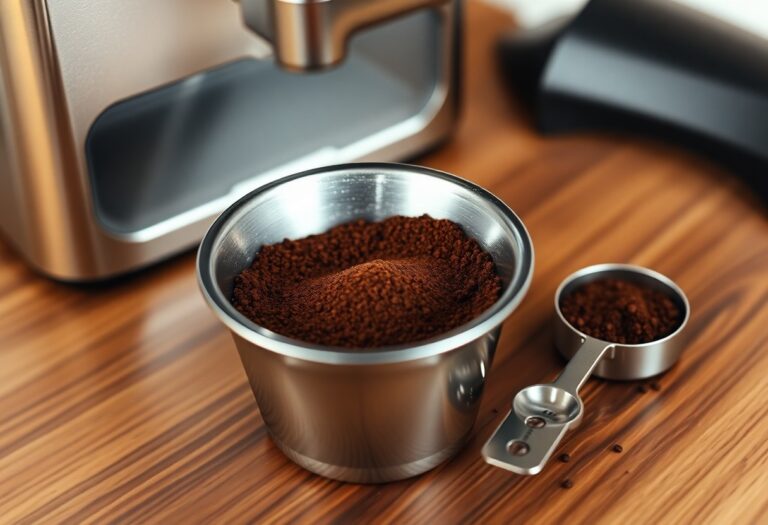What Does Calc Mean on a Bosch Coffee Machine – Descaling Alert
Most likely, you’ve noticed the Calc alert on your Bosch coffee machine, signaling it’s time for descaling. This message indicates the buildup of lime scale, which can negatively impact your brewing process and the longevity of your appliance. If you ignore this alert, your coffee’s taste may diminish, and damage could occur over time. Descaling not only ensures optimal performance but also enhances your overall coffee experience. In this post, you’ll learn why descaling is vital and how to tackle the Calc alert effectively for better results.
Key Takeaways:
- The ‘Calc’ indicator on a Bosch coffee machine signals that it’s time for descaling to remove mineral buildup from the water system.
- Regular descaling helps maintain the performance and longevity of the coffee machine, ensuring optimal taste and quality of brewed coffee.
- Descaling frequency may vary based on water hardness; it is advisable to refer to the user manual for specific recommendations.
- Use a descaling solution recommended by Bosch or a compatible option to avoid potential damage to the machine.
- Following the descaling process as indicated in the manual will help reset the ‘Calc’ alert after completion.
The Meaning Behind “Calc” on Your Bosch Coffee Machine
The “Calc” indicator signifies that your Bosch coffee machine requires descaling. This alert appears when mineral deposits from hard water accumulate within the machine, potentially affecting its performance and the quality of your coffee. The presence of this alert serves as a prompt, pushing you to maintain your machine’s health and ensuring that it operates optimally. Ignoring this signal may lead to decreased efficiency and unpleasant tastes in your brews.
What “Calc” Signifies in the Context of Coffee Machines
In coffee machines, “Calc” specifically denotes calcium buildup within the system. This buildup, primarily due to hard water, can obstruct vital components, including the heating element and water pathways. Over time, this can result in longer brewing times and uneven extraction, ultimately compromising the flavors of your coffee. Understanding this alert allows you to take proactive steps in maintaining your machine’s performance and longevity.
How the Descaling Alert Benefits Your Brew Quality
Addressing the descaling alert promptly can vastly improve your coffee’s flavor and aroma. By removing mineral deposits, you ensure that your machine heats water uniformly and maintains optimal water pressure. This connection between machine care and brew quality is significant; machines that are regularly descaled tend to deliver a more consistent taste and a richer experience overall. The cleaning process not only enhances the immediate quality of your coffee but also prolongs the lifespan of your equipment.
When you descale your Bosch coffee machine upon receiving the “Calc” alert, you remove not just calcium, but also limescale, which can affect how water flows through your machine. By ensuring smooth operation, you’ll notice that your coffee brews faster and with better flavor extraction. The frequency of your maintenance can also play a role; for machines used daily, monthly descaling is often recommended. This proactive approach not only remedies any existing issues but also prevents future buildup, helping you savor every cup of coffee as intended.

The Impact of Calcium Build-Up on Coffee Machine Performance
Calcium build-up can severely hinder your coffee machine’s performance, leading to inefficient brewing and subpar coffee quality. Over time, limescale accumulation restricts water flow and can even affect temperature regulation. This not only influences the extraction flavors but can also diminish the lifespan of your appliance. Regular maintenance, including descaling, is vital to keep your coffee machine functioning optimally and ensuring a consistently great brew.
Understanding the Formation of Limescale
Limescale forms when water, rich in minerals like calcium and magnesium, evaporates or is heated. As the liquid transforms, deposits are left behind, gradually creating a hard residue in your machine. This buildup is exacerbated by using hard water, which is more likely to precipitate these minerals. Without intervention, limescale builds up to a point where it can drastically affect the machine’s efficiency.
Consequences of Ignoring the Descaling Alert
Ignoring the descaling alert can lead to reduced brewing efficiency, poor coffee flavors, and even potential breakdowns. As limescale accumulates, it obstructs components, putting additional strain on the machine. Over time, this can result in costly repairs or premature replacement of your coffee maker.
Failure to heed the descaling alert leads to a domino effect that can not only compromise your coffee’s taste but also escalate maintenance issues. Machines with significant limescale deposits might require increased energy to heat water, leading to higher utility bills. Furthermore, prolonged neglect could ultimately culminate in significant damage that might necessitate professional servicing or replacement, straining your budget more than routine descaling would have. In the long run, prioritizing descaling keeps your coffee machine in optimal working condition, allowing for a consistently exceptional coffee experience.
The Descaling Process: Step-by-Step Guide
| Step | Description |
| 1 | Empty the water reservoir and remove any coffee grounds. |
| 2 | Mix the descaling solution with water according to the manufacturer’s instructions. |
| 3 | Pour the mixture into the water reservoir. |
| 4 | Start the descaling program on your Bosch coffee machine. |
| 5 | Rinse the reservoir and repeat with clean water to flush the system. |
Preparing Your Bosch Coffee Machine for Descaling
Begin by ensuring your Bosch coffee machine is powered off and unplugged. Detach the water reservoir and remove any coffee pods or filters still in place. Empty the reservoir completely and wipe it down to remove any remaining coffee residue. This preparatory step helps achieve the best results during the descaling process by eliminating any interference from old coffee materials.
Recommended Descaling Solutions: What to Use and What to Avoid
Descaling solutions specifically designed for coffee machines are optimal for maintaining your Bosch coffee maker’s integrity. Avoid using homemade mixtures, such as vinegar or citric acid, which could harm the internal components. Instead, look for branded descalers that ensure effective calcium removal without damaging your machine.
Commercial descaling solutions should be your go-to, as they are formulated to tackle mineral deposits effectively while being safe for use in coffee machines. Products from reputable brands like Bosch’s own descaler, or those certified for espresso machines, excel in this regard. Homemade alternatives like vinegar can seem appealing due to their availability, but their acidity may lead to long-term damage to seals and plastics within your coffee machine, counteracting positive effects of regular maintenance.

Preventive Measures: Maintaining Your Coffee Machine’s Longevity
To extend the life of your coffee machine, focus on regular upkeep and care. Maintaining cleanliness is crucial; regularly clean removable components, such as the drip tray and water reservoir with warm, soapy water. Additionally, using filtered or bottled water can minimize mineral build-up, ultimately reducing the frequency of descaling cycles. A consistent maintenance schedule will not only preserve your machine’s performance but also enhance the flavors of your coffee.
Best Practices for Regular Maintenance
Developing a routine for your coffee machine’s maintenance can significantly impact its longevity. Scheduling bi-weekly cleanings for the exterior and filters will keep your machine in top condition. Utilizing a damp cloth for exterior surfaces prevents grime accumulation, and using vinegar or descaling agents occasionally will help manage mineral deposits. Always refer to the manufacturer’s guidelines for recommended cleaning products to avoid damaging the components.
How Frequency of Use Affects Descaling Needs
The amount of coffee you brew directly influences how often you need to descale your machine. Regular use increases mineral deposits, especially in areas with hard water. For individuals brewing multiple cups daily, descaling every month may be necessary. Conversely, if you brew occasionally, quarterly descaling could suffice. By paying attention to your brewing habits, you can tailor your descaling schedule to optimize your machine’s performance without unnecessary maintenance.
For instance, if you’re brewing three pots of coffee a day, you may find that calcium deposits accumulate rapidly due to the consistent heat and water flow through your machine. In contrast, if you enjoy a pot on weekends only, extending the descaling to every three months makes more sense. Keep an eye on the Calc alert and remain attentive to changes in your coffee’s taste, as these can indicate when it’s time to take action.
Real User Experiences: Insights From Bosch Coffee Machine Owners
Users of Bosch coffee machines often share their experiences related to the Calc alert, revealing both frustrations and solutions. Many report that descaling regularly has significantly improved the longevity and performance of their devices. Owners emphasize the satisfaction of enjoying rich coffee flavors, enhanced by the optimal functioning of their machines. Descaling seems to be a shared mantra among users, streamlining the upkeep of their coffee-making experience.
Common Issues and Resolutions Related to Descaling
Several common concerns arise when descaling your Bosch coffee machine. Many users encounter issues like error messages or inadequate descaling performance. To combat these challenges, the majority have found that following the manufacturer’s instructions meticulously and using the recommended descaling solutions resolves the bulk of the problems. Regular maintenance and prompt action upon seeing the Calc alert can make a notable difference.
Tips and Tricks from Seasoned Users
Veteran owners of Bosch coffee machines offer valuable advice to enhance your descaling routine. They recommend scheduling descaling every 2-3 months, even if the Calc alert hasn’t activated, to preempt buildup. Another tip is using distilled water for brewing to minimize mineral deposits. You might also find that letting descaling solution sit a little longer improves results. After extensive testing, these ideas ensure consistent, flavorful coffee.
- Schedule descaling every 2-3 months even before alerts.
- Consider using distilled water to avoid future calcification.
- Let the solution sit longer for improved descaling.
Sharing gathered wisdom can significantly enhance your coffee experience. Many users also recommend storing the coffee machine in a less humid area to prevent unnecessary buildup and employing a soft brush for cleaning hard-to-reach areas. It’s beneficial to explore forums or social media groups where users frequently discuss their best practices and troubleshooting tips. After fine-tuning your routine with these insights, you’ll likely see remarkable improvements in your machine’s performance.
- Store your machine in a less humid area to reduce buildup.
- Use a soft brush for thorough cleaning.
- Participate in forums for shared experiences and insights.
Summing up
With these considerations, understanding what “Calc” means on your Bosch coffee machine is important for maintaining its performance and longevity. This descaling alert serves as a notification that your machine requires attention to remove mineral buildup, ensuring that your coffee retains optimal flavor and quality. By promptly addressing the “Calc” alert and following descaling instructions, you can enhance your brewing experience and extend the life of your appliance. Regular maintenance not only keeps your coffee machine running smoothly but also enhances your daily coffee ritual.
FAQ
Q: What does ‘Calc’ mean on my Bosch coffee machine?
A: The ‘Calc’ indicator on your Bosch coffee machine signifies that it’s time to descale the machine. This feature helps to maintain optimal performance and extend the lifespan of your coffee maker by notifying you when mineral buildup from hard water is present.
Q: Why is descaling my Bosch coffee machine important?
A: Descaling is important because mineral deposits can accumulate over time, affecting the heating elements and other internal components of the machine. This buildup can lead to reduced efficiency, decreased brewing temperature, and even potential damage to the machine if not addressed.
Q: How do I descale my Bosch coffee machine when the ‘Calc’ light is on?
A: To descale your Bosch coffee machine, first, prepare a descaling solution, either store-bought or homemade using citric acid. Fill the water tank with the solution, start the descaling program by following the manufacturer’s instructions, and run the cycle. Make sure to rinse the machine thoroughly with clean water afterward to avoid any residual taste from the descaling solution.
Q: How often should I descale my Bosch coffee machine?
A: The frequency of descaling your Bosch coffee machine depends on your water hardness and usage. As a general guideline, it’s recommended to descale every 2-3 months if you use the machine daily, or whenever the ‘Calc’ indicator lights up. If you have hard water, you may need to descale more often.
Q: Is there a specific descaling solution I should use for my Bosch coffee machine?
A: Bosch recommends using their specific descaling solution that is compatible with their coffee machines. However, you can also use alternative descalers like citric acid or vinegar diluted with water. Always check your machine’s manual for recommendations about suitable descaling products to avoid voiding the warranty.







